
| HOME |
| NERVE |
| REVIEWS |
| ARCHIVE |
| EVENTS |
| LINKS |
| ABOUT US |
| CONTRIBUTORS |
| BACK ISSUES |
| CONTACT US |
Back to index of Nerve 11 - Winter 2007
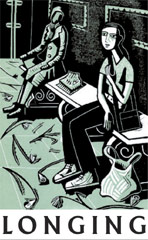 Merseyscribes
Merseyscribes
Deborah Mulhearn, editor of Mersey Minis, searches for the quintessential Liverpool novel.
Liverpool has always produced writers. Poets and playwrights most famously, but dozens of locally-born screenwriters, songwriters, sketch writers and journalists have also used Liverpool or Merseyside for material. But not many have chosen the novel as their creative medium.
When I was researching material for Mersey Minis, I made long lists of people – not just writers – who had visited, lived or worked here. It wasn’t hard to find material – just about everyone, it seems, has an opinion about Liverpool. There are more than three hundred writers in Mersey Minis, and their voices range across centuries, countries, genres, professions and class. I’ve included extracts from letters, travel writing, memoirs, essays, autobiographies and just the daft things people have said about us over the years.
Fictional recreations of Liverpool, however, proved harder to find. While plenty of novelists described Liverpool in letters and journals, less than a tenth of the extracts in Mersey Minis are fictionalised accounts from novels or short stories. And local novelists wrote less than half of these.
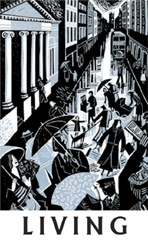 The
nineteenth century saw the great blossoming of the novel form, but it’s
strange that at this most fascinating, fluid, visceral period, no local
writers were fictionalising the city and its workings. Were we too busy
making money or mayhem, or just surviving, to create an imaginative literary
world? We have Jane Austen’s Bath, Mrs Gaskell’s Manchester,
and later, James Joyce’s Dublin, but whose Liverpool?
The
nineteenth century saw the great blossoming of the novel form, but it’s
strange that at this most fascinating, fluid, visceral period, no local
writers were fictionalising the city and its workings. Were we too busy
making money or mayhem, or just surviving, to create an imaginative literary
world? We have Jane Austen’s Bath, Mrs Gaskell’s Manchester,
and later, James Joyce’s Dublin, but whose Liverpool?
Liverpool crops up again and again in the non-fiction work of many writers, but it took outsiders to fictionalise the horrors and hypocrisies of Victorian Liverpool. Perhaps Herman Melville’s autobiographical novel Redburn is the strongest contender for the quintessential Liverpool novel. Or Silas K Hocking’s Her Benny, a book that every schoolchild once read and wept over. But Melville was an American sailor, and Hocking a Methodist minister from Cornwall.
The twentieth century looked more promising. During my research I came across an obscure Liverpool-set novel, The Cotton Broker, by John Owen. This was published in 1921 and tells the story of Edward ‘Prosperity’ Crossford, a Gatsby-like figure who has risen to riches from a working class background but at a moral cost. Crossford marries the boss’s daughter and moves to the Wirral, but behind the new-found wealth lies a guilty secret. John Owen was the pseudonym of Frank Elias, who turned to writing after the first world war when he had moved from his native Liverpool to Suffolk. The Cotton Broker isn’t great literature, but it does create a fictional Liverpool at a fascinating point in its history.
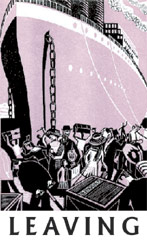 Probably
the most famous early twentieth century Merseyside writer is Malcolm Lowry.
Born in Wallasey in 1909, Lowry went away to sea at 18, though he revisited
Liverpool and Wirral in passing in his novels. But he is more associated
with Mexico, where his most famous novel Under the Volcano is set.
Probably
the most famous early twentieth century Merseyside writer is Malcolm Lowry.
Born in Wallasey in 1909, Lowry went away to sea at 18, though he revisited
Liverpool and Wirral in passing in his novels. But he is more associated
with Mexico, where his most famous novel Under the Volcano is set.
A less well-known writer is George Garrett. Garrett was an active Communist during the 1920s, who had long spells of unemployment because of his political beliefs. He met Orwell and the left wingers of literary London, who admired his work and critical insights. But he is an inexplicably neglected figure nowadays. His powerful short story The Pianist appears in Mersey Minis, a darkly comic portrayal of how unemployment destroys a sensitive man.
Perhaps Liverpool’s greatest unsung novelist is James Hanley. Hanley was actually born in Ireland but came to Liverpool as a baby, so I think it’s fair to claim him as a Liverpool writer. Championed by E M Forster, he wrote unsparing novels of his seagoing experiences, startlingly original in both subject matter and style. Boy is the unbearably grim tale of a cabin boy - so heartbreaking it’s barely readable – which prompted a court case for obscenity that effectively finished Hanley’s career in the 1930s.
Later there was Nicholas Monsarrat, who was born in Rodney Street, and left Liverpool to seek his fortune in London with just £40 and a typewriter. He ended up sleeping rough for a while, but then achieved fame with his classic novel of the second world war, The Cruel Sea, first published in 1951.
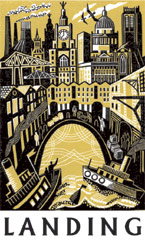 A
less celebrated writer who also served in the second world war was Richard
Passmore, the pseudonym of Roger Peacock. Peacock was born in Liverpool
and joined the RAF, later turning to writing. Injuries sustained in the
war meant that he literally couldn’t smile, but he wrote comic short
stories and biographical accounts of his Liverpool boyhood. I’ve
used extracts from Thursday is Missing in Mersey Minis.
A
less celebrated writer who also served in the second world war was Richard
Passmore, the pseudonym of Roger Peacock. Peacock was born in Liverpool
and joined the RAF, later turning to writing. Injuries sustained in the
war meant that he literally couldn’t smile, but he wrote comic short
stories and biographical accounts of his Liverpool boyhood. I’ve
used extracts from Thursday is Missing in Mersey Minis.
Another strong contender for the quintessential Liverpool novel is City of Departures by John Brophy. City of Departures is a strange novel, didactic and oddly structured. It is the story of two London exiles who return to Liverpool to escape the London blitz but are at best ambivalent and often hostile towards their home town. But there are wonderful descriptive passages of war-torn Liverpool and the blighted lives of its inhabitants.
The future for the Liverpool novel looks promising. Niall Griffiths and Kevin Sampson use Liverpool settings and characters in their uncompromising contemporary novels. Other talented sons of the city are now reinventing themselves as novelists and short story writers: Alexei Sayle, Willy Russell, Frank Cottrell-Boyce. Science fiction, horror and crime are well represented genres amongst Merseyside writers, with writers such as Olaf Stapledon, Douglas Mason, Ramsey Campbell, Stephen Baxter, Clive Barker and Margaret Murphy.
Although there are a lot of women writers in Mersey Minis, few are from Merseyside. Apart from Beryl Bainbridge and Linda Grant, I didn’t come across many other novelists who have used Liverpool as their fictional universe, although I’m kicking myself as I write this because I missed May Sinclair. Sinclair was from Rock Ferry and wrote spare, modernist novels in the 1920s and was reputedly the first person to use the phrase ‘stream of consciousness’ as a literary rather than psychoanalytical term.
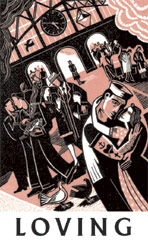 I
don’t think, however, that Sinclair set any of her work in Liverpool.
Likewise another Merseyside-born writer, J G Farrell. Farrell won the
Booker Prize in 1973 and wrote the magnificent novel Troubles, but this
is set in Ireland. I didn’t find any descriptions of Liverpool,
and he died in a fishing accident at the height of his success.
I
don’t think, however, that Sinclair set any of her work in Liverpool.
Likewise another Merseyside-born writer, J G Farrell. Farrell won the
Booker Prize in 1973 and wrote the magnificent novel Troubles, but this
is set in Ireland. I didn’t find any descriptions of Liverpool,
and he died in a fishing accident at the height of his success.
So there are plenty of omissions in Mersey Minis. Sometimes it was impossible to get copyright permission in time, or at all, or at a reasonable cost. In other cases it was impossible to track down the copyright owner - Thomas Armstrong’s King Cotton for one. So to be on the safe side I left it out. I’m sure others will be brought to my attention, like Sinclair, that I’ve missed or never heard of. Maybe it’ll be that quintessential Liverpool novel.
Mersey Minis, published by Capsica, 2007, are available throughout Merseyside bookshops and at www.loveliverpoolbooks.com or find out more about the whole project at www.merseyminis.com. Illustrations by Clare Curtis
Sorry Comments Closed
Comment left by Larraine Leonard on 7th November, 2010 at 22:52
Thank you for some wonderfull information on Liverpool Lit. I will track down some of these books and sure to enjoy. My mother sent me a copy of Her Benny years ago and I won't part with it. Larraine Leonard
Comment left by Geoff Robb on 7th February, 2011 at 13:59
I saw your mention of Richard Passmore (Roger Peacock) and I have ordered his books since knowing he was a writer.
He was my teacher in Harrow, Middlesex when I was at secondary school 1954-59. He spoke fluent German, as I now do and I always wanted to contact him.
He was an extraordinary fellow with a great love for his fellow man, and was an interesting teacher too.
Reading his book, Thursday Is Missing, I am now tempted to write my own biography as my life today has little to do with what it was back in the 1950s.
Roger Peacock died in 1996 but I'll always remember him with gratitude.
Cheerz, Geoff.
Geoff & Marie-Annick Robb
27, Avenue Melanie Tombarel
Les Hauts de Peyniblou
06560 Valbonne, France
Tel: +33 4 93 12 1224
E-Mail: geoff.robb@free.fr
I can resist everything except temptation !
Comment left by Eddie Vaughan on 6th April, 2011 at 22:03
Hiya ! Debbie,
Delighted to see Roger (Richard) mentioned in Merseyscribes .
Some years ago I was attracted to one of Roger's books , by t he dustjacket which was a wartime Red Cross letter to his mother in Adelaide road, Kensington. Soon after, Richard (Roger) was having dinner at our home and recalling his life thus far.
Each new year thereafter I was on the mailing list for his annual 'newsletter'. When he bailed out from the blazing aircraft he was half the lowest safe height for survival ! He'd lost time checking to see if anyone else was on board (No!).
Geoff Robb's comments about the man are an understatement !
Thanks, Geooff . Eddie .